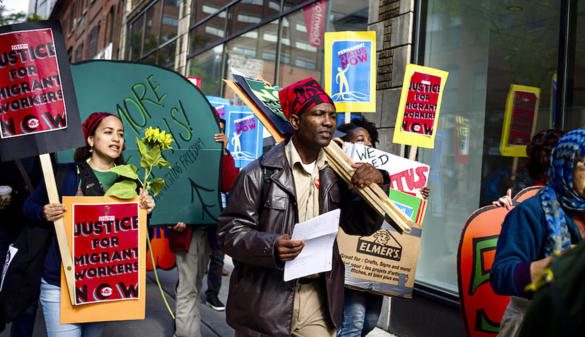By Pam Wright | Chatham Voice
Gabriel Allahdua had high expectations when he came to Canada to work in a Leamington, Ont., greenhouse in 2012.
But his hopes were dashed when he discovered the realities of life as a temporary foreign worker.
“I thought I was going to a place where everything was right and just,” Allahdua told The Voice in a recent interview. “Canada presents itself on the world stage as a champion of human rights. Little did I know I was entering a culture of silence.”
Allahdua, author of a book called ‘Harvesting Freedom: The Life a Migrant Worker in Canada,’ is bringing his justice-seeking message to Chatham-Kent Sept. 15. He’s giving a talk at the Chatham Cultural Centre beginning at noon.
As part of his presentation, Allahdua will explore themes surrounding the hidden costs in Canada’s food system, highlighting the importance of sustainability throughout all phases of agriculture, noting the process should “nourish” everything from workers to the land.
“As a migrant farm worker in Canada, I was called essential – but treated as disposable,” he explained. “I was tied to a single employer, denied basic human rights, and excluded from the protections other workers take for granted, I laboured in fields that feed this country while being made vulnerable by law.”
Born on the island of St. Lucia in the Caribbean, Allahdua worked under the Seasonal Agricultural Worker Program (SAWP) for four seasons. In 2015, he left the program to seek permanent residency here. Now a leader in the migrant worker justice movement. Allahdua works for Justicia for Migrant Workers and is an outreach worker with The Neighbourhood Organization, providing services to migrant workers across southwestern Ontario.
In his home country, Canada isn’t thought of as just a country, it was a “standard,” Allahdua said.
However, Allahdua said he was “shocked” by what he found. Workers often work 14 to 16 hours a day from sunrise to sunset, but are excluded from overtime pay.
Being tied to one employer is another big problem, he said, as workers have to be invited back each year by employers, which leads to workers going “above and beyond” to please their bosses, and that can negatively impact health.
Allahdua said the current terms of the SAWP is a “gift” from the Canada government, allowing employers to exploit and profit off of workers, leading to the creation of a “vulnerable workforce.”
In order to change the system, Allahdua said the rules must change.
“We’re not saying that all employers are bad…we just want to put pressure on politicians to change unjust rules and policies,” he said.
“We want a food system that is healthy and sustainable. We want it to be just for both sides, including consumers.”
Beefing up the nation’s food security policy is an issue government needs to tackle, he said, as it is increasingly putting the system “into the hands of a few CEOs.”
Put on by CK Local Immigration Partnership and the Chatham-Kent Public Library, the free event is open to all and no registration is required.
Funding for the program was made possible by the Rotary Club of Chatham in celebration of Welcome Week.
Copies of “Harvesting Freedom: The Life of a Migrant Worker in Canada” are available to borrow from Chatham-Kent Public Library.





